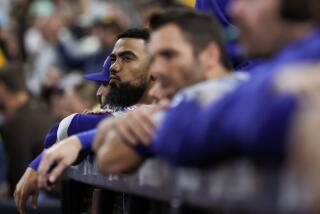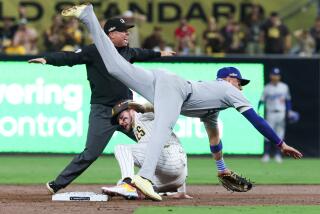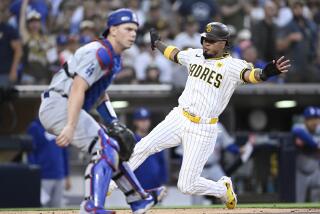Bad Penny Turns Up
- Share via
SAN FRANCISCO — A thorough understanding of the physics phenomenon known as heat transfer requires knowledge of the first law of thermodynamics and distinguishing among conduction, convection and radiation.
Or, watching the Giants torch the Dodgers, 7-3, Friday night at chilly AT&T; Park.
No team had emanated more heat than the Dodgers during a 17-2 stretch that resulted in their gaining 10 1/2 games in the National League West standings. The Giants, meanwhile, had been McCovey Cove cold, dropping into last place, the final indignity coming Sunday in a 1-0 extra-inning loss to the Dodgers that culminated a series sweep.
Yet five days later the Giants had gained a glow from winning four in a row against the San Diego Padres. And by the time closer Armando Benitez nailed down the final out Friday, the Giants were smoldering, having seemingly sucked heat directly from the Dodgers.
Giants right-hander Jason Schmidt, who had nothing to show for eight scoreless innings Sunday, was nearly untouchable after giving up a run in the first inning Friday, finally tiring with one out in the eighth and leaving to a standing ovation from the bundled capacity crowd.
Dodgers right-hander Brad Penny, who had won his previous three starts, was knocked around for six runs in six innings, including two-run home runs by Omar Vizquel in the third and Shea Hillenbrand in the sixth.
“The pitch to Vizquel was probably my worst of the season,” Penny said.
The closest the Dodgers could come to the long ball was a drive by Andre Ethier with two out and two on in the eighth that died on the warning track, enabling the Giants to preserve their three-run lead, and the advantage grew when Steve Finley led off the bottom of the inning with a home run against reliever Elmer Dessens.
“Penny got behind in the count a lot but he was missing by less than an inch,” Dodgers Manager Grady Little said. “He was right around the strike zone. And Schmidt was on top of his game. It seemed like every pitch he threw was a strike.”
A clear grasp of gravity-induced pressure gradients or the electromagnetic spectrum wasn’t necessary. This kind of heat transfer was evident in the ebb and flow of nine innings.
Schmidt’s close pitches were strikes. For Penny, they were balls. The Giants’ big swings produced home runs. For the Dodgers, they were long outs.
And the lone casualty of the cool weather was a Dodger -- shortstop Rafael Furcal left in the eighth because of tightness in his shoulder.
“He’ll be day to day,” Little said. “He’ll probably be out there [tonight].”
The only surprise in the lineup was right fielder J.D. Drew, who didn’t start Sunday with Schmidt pitching because he was three for 27 with 13 strikeouts against him.
Little said he “rolled the dice” by playing Drew -- batting him cleanup no less -- and he struck out with two on and two out in the third and flied out in the seventh. Drew also had a chance to get the Dodgers back in the game in the eighth against reliever Vince Chulk, but all he could muster was a sacrifice fly with one out and the bases loaded.
Jeff Kent singled to cut the deficit to 6-3, then left-hander Mike Stanton came in to face Ethier, who jumped in the air in disgust after Finley chased down his drive to right-center.
The Dodgers’ inability to hit home runs -- they rank last in the NL with 102 -- is more noticeable when their opponents are blasting the ball out of the park. And their inability to win consistently on the road -- they are 25-33 -- could become especially noticeable because they play 24 of their last 40 games away from Dodger Stadium, including the next eight.
They still hold a three-game lead in the division, but the race tightened because the Padres tied the Diamondbacks for second place by defeating them. The Giants and Colorado Rockies tied as well, five games behind the Dodgers.
“All of our games are equally important,” Penny said. “It doesn’t matter where they are.”
More to Read
Are you a true-blue fan?
Get our Dodgers Dugout newsletter for insights, news and much more.
You may occasionally receive promotional content from the Los Angeles Times.










